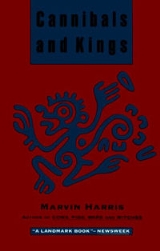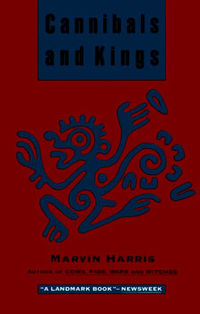
Cannibals and Kings
Encyclopedia

Marvin Harris
Marvin Harris was an American anthropologist. He was born in Brooklyn, New York. A prolific writer, he was highly influential in the development of cultural materialism...
. The book presents a systematic discussion of ideas about the reasons for a culture making a transition by stages from egalitarian hunter-gatherer
Hunter-gatherer
A hunter-gatherer or forage society is one in which most or all food is obtained from wild plants and animals, in contrast to agricultural societies which rely mainly on domesticated species. Hunting and gathering was the ancestral subsistence mode of Homo, and all modern humans were...
to hierarchically based states
State (polity)
A state is an organized political community, living under a government. States may be sovereign and may enjoy a monopoly on the legal initiation of force and are not dependent on, or subject to any other power or state. Many states are federated states which participate in a federal union...
as population density increases.
According to Harris, humans shifted from a low-carbohydrate
Carbohydrate
A carbohydrate is an organic compound with the empirical formula ; that is, consists only of carbon, hydrogen, and oxygen, with a hydrogen:oxygen atom ratio of 2:1 . However, there are exceptions to this. One common example would be deoxyribose, a component of DNA, which has the empirical...
diet largely based on hunter-gatherer sources to a high-carbohydrate diet largely based on agricultural
Agriculture
Agriculture is the cultivation of animals, plants, fungi and other life forms for food, fiber, and other products used to sustain life. Agriculture was the key implement in the rise of sedentary human civilization, whereby farming of domesticated species created food surpluses that nurtured the...
when intensive agriculture began. Harris posits that this diet change resulted in more body fat, which for females led to earlier menarche
Menarche
Menarche is the first menstrual cycle, or first menstrual bleeding, in female human beings. From both social and medical perspectives it is often considered the central event of female puberty, as it signals the possibility of fertility....
and a smaller reduction in fertility from nursing infants, which then led to shorter periods between pregnancies. Harris also describes the state of the world in the late 19th century as one of approaching catastrophe as predicted by Malthus (Malthusian catastrophe
Malthusian catastrophe
A Malthusian catastrophe was originally foreseen to be a forced return to subsistence-level conditions once population growth had outpaced agricultural production...
). Harris then discusses three 20th century innovations that explain this postponement of the catastrophe: the exploitation of petroleum
Petroleum
Petroleum or crude oil is a naturally occurring, flammable liquid consisting of a complex mixture of hydrocarbons of various molecular weights and other liquid organic compounds, that are found in geologic formations beneath the Earth's surface. Petroleum is recovered mostly through oil drilling...
, reliable contraceptives, and social changes in some cultures that make smaller families more desirable.
Cannibals and Kings discusses the development of pork
Pork
Pork is the culinary name for meat from the domestic pig , which is eaten in many countries. It is one of the most commonly consumed meats worldwide, with evidence of pig husbandry dating back to 5000 BC....
as a taboo
Taboo
A taboo is a strong social prohibition relating to any area of human activity or social custom that is sacred and or forbidden based on moral judgment, religious beliefs and or scientific consensus. Breaking the taboo is usually considered objectionable or abhorrent by society...
food in ancient Israelite
Israelite
According to the Bible the Israelites were a Hebrew-speaking people of the Ancient Near East who inhabited the Land of Canaan during the monarchic period .The word "Israelite" derives from the Biblical Hebrew ישראל...
society. Harris argues that while cattle, sheep and many other domesticated animals consume grass, pigs in a desert
Desert
A desert is a landscape or region that receives an extremely low amount of precipitation, less than enough to support growth of most plants. Most deserts have an average annual precipitation of less than...
environment are poor grazers and must compete with humans for grain. that pigs produce no utility aside from meat, compared with cattle and goats, which provide milk, transport, and labor. This led to pigs being reviled, and he argues this gave rise to the pig as a taboo food in the Old Testament
Old Testament
The Old Testament, of which Christians hold different views, is a Christian term for the religious writings of ancient Israel held sacred and inspired by Christians which overlaps with the 24-book canon of the Masoretic Text of Judaism...
and goes on to briefly discuss the other listed taboos. Harris notes that pigs were also taboo in Ancient Egypt
Ancient Egypt
Ancient Egypt was an ancient civilization of Northeastern Africa, concentrated along the lower reaches of the Nile River in what is now the modern country of Egypt. Egyptian civilization coalesced around 3150 BC with the political unification of Upper and Lower Egypt under the first pharaoh...
and continue to be forbidden by Islam, suggesting that environmental rather than cultural factors are responsible for putting this food animal off limits.
Harris also discusses the cow as a sacred animal and taboo food in Hindu culture. Unlike the Middle Eastern civilizations, India had developed very productive forms of agriculture, requiring heavy labor. The high population densities and the periodic droughts rendered animal husbandry for food purposes impractical, and slowly led to the ending of animal sacrifice
Animal sacrifice
Animal sacrifice is the ritual killing of an animal as part of a religion. It is practised by many religions as a means of appeasing a god or gods or changing the course of nature...
. However, cattle remained an important species because they provided farm labor. Desperation incurred during periods of drought might lead to the temptation to slaughter and eat the work animals for short-term survival; this would damage long-term prospects by destroying the means of production. Harris argues that this situation led to the evolution of the cow as a taboo food and its worship as a sacred creature in India.
Harris examines the concept of the hydraulic empire
Hydraulic empire
A hydraulic empire is a social or government structure which maintains power and control through exclusive control over access to water...
, ancient civilizations such as China
China
Chinese civilization may refer to:* China for more general discussion of the country.* Chinese culture* Greater China, the transnational community of ethnic Chinese.* History of China* Sinosphere, the area historically affected by Chinese culture...
, Persia, and Egypt
Egypt
Egypt , officially the Arab Republic of Egypt, Arabic: , is a country mainly in North Africa, with the Sinai Peninsula forming a land bridge in Southwest Asia. Egypt is thus a transcontinental country, and a major power in Africa, the Mediterranean Basin, the Middle East and the Muslim world...
that were reliant on water for agriculture. The necessity of labor-intensive projects such as irrigation
Irrigation
Irrigation may be defined as the science of artificial application of water to the land or soil. It is used to assist in the growing of agricultural crops, maintenance of landscapes, and revegetation of disturbed soils in dry areas and during periods of inadequate rainfall...
, canals, and flood control dikes led to the development of strong, centralized, and despotic states to mobilize the needed manpower for construction. Despite foreign conquest or change of government, the nature of such states would remain essentially unchanged because of the unchanging need to mobilize human labor.
Because European agriculture relied upon rainfall and not irrigation, Harris argues, European rulers under feudalism
Feudalism
Feudalism was a set of legal and military customs in medieval Europe that flourished between the 9th and 15th centuries, which, broadly defined, was a system for ordering society around relationships derived from the holding of land in exchange for service or labour.Although derived from the...
were unable to effectively monopolize power and restrict the rising power of towns. The growth of towns and cities, from a combination of population growth and urban migration, would lead to early forms of capitalism
Capitalism
Capitalism is an economic system that became dominant in the Western world following the demise of feudalism. There is no consensus on the precise definition nor on how the term should be used as a historical category...
.

